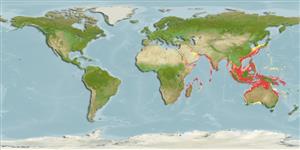>
Carangiformes (Jacks) >
Carangidae (Jacks and pompanos) > Naucratinae
Etymology: Seriolina: Latin word diminutive with the meaning of a large earthenware pot (Ref. 45335).
More on author: Rüppell.
Environment: milieu / climate zone / depth range / distribution range
Ekologi
marina; brackvatten revassocierade; djupintervall 20 - 150 m (Ref. 30573). Tropical; 38°N - 35°S, 20°E - 163°E
Indo-West Pacific: Red Sea and East Africa to Japan, Australia and Solomon Island. Southeast Atlantic: southeast coast of South Africa (Ref. 3197).
Size / Vikt / Age
Maturity: Lm ? range ? - ? cm
Max length : 77.5 cm TL hane/ej könsbestämd; (Ref. 30504); common length : 50.0 cm TL hane/ej könsbestämd; (Ref. 5450); publicerad maxvikt: 5.2 kg (Ref. 3287)
Taggstrålar i ryggfenan (totalt): 8 - 9; Mjukstrålar i ryggfenan (totalt): 30-37; Taggstrålar i analfenan 2; Mjukstrålar i analfenan: 15 - 18. Color bluish grey to black dorsally, white to dusky below; 5-7 dark oblique bands or blotches on young disappear with age. Posterior spines of dorsal fin minute or embedded in large adults; first anal spine usually embedded. Gill rakers are mostly rudiments. Grooves of caudal peduncle present dorsally and ventrally. Maxilla reaching below rear margin of the eyes.
Mainly in offshore reefs on the continental shelf (Ref. 30573, 48635), on rocky bottoms (Ref. 11230). Non-schooling. Juveniles under weed rafts and adults are sometimes seen with the large planktivores such as whale sharks (Ref. 48635). Adults feed on demersal fishes, cephalopods, and shrimp (Ref. 11441). Excellent food fish (Ref. 3197); marketed fresh and dried salted (Ref. 3287).
Life cycle and mating behavior
Könsmognad | Reproduktion | Lek | Ägg | Fecundity | Larver
Paxton, J.R., D.F. Hoese, G.R. Allen and J.E. Hanley, 1989. Pisces. Petromyzontidae to Carangidae. Zoological Catalogue of Australia, Vol. 7. Australian Government Publishing Service, Canberra, 665 p. (Ref. 7300)
IUCN Red List Status (Ref. 130435)
Threat to humans
Harmless
Human uses
Fiskeri: mindre kommeriell; sportfisk: ja
Ytterligare information
PopulärnamnsynonymerMetabolikPredatorerEkotoxikologiReproduktionKönsmognadLekSpawning aggregationFecundityÄggEgg development
Verktyg
Special reports
Download XML
Internet-källor
Estimates based on models
Preferred temperature (Ref.
123201): 21.9 - 28.3, mean 27 °C (based on 911 cells).
Phylogenetic diversity index (Ref.
82804): PD
50 = 1.0000 [Uniqueness, from 0.5 = low to 2.0 = high].
Bayesian length-weight: a=0.02344 (0.01149 - 0.04783), b=2.93 (2.75 - 3.11), in cm total length, based on LWR estimates for this species & (Sub)family-body (Ref.
93245).
Trofisk nivå (Ref.
69278): 4.2 ±0.57 se; based on food items.
Resiliens (Ref.
120179): Mellan, lägsta populationsfördubblingstid 1,4-4,4 år (Assuming tm=2-4).
Fishing Vulnerability (Ref.
59153): Moderate to high vulnerability (51 of 100).
Climate Vulnerability (Ref.
125649): High vulnerability (61 of 100).
Nutrients (Ref.
124155): Calcium = 38.8 [16.6, 67.1] mg/100g; Iron = 0.608 [0.325, 1.237] mg/100g; Protein = 19 [17, 21] %; Omega3 = 0.136 [0.080, 0.257] g/100g; Selenium = 45.2 [22.4, 89.8] μg/100g; VitaminA = 33 [8, 136] μg/100g; Zinc = 0.815 [0.528, 1.203] mg/100g (wet weight); based on
nutrient studies.
